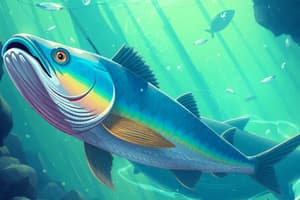Podcast
Questions and Answers
What does Republic Act No. 10654 primarily aim to improve regarding aquaculture?
What does Republic Act No. 10654 primarily aim to improve regarding aquaculture?
- Increase the amount of fish produced
- Promote local fish consumption
- Reduce the number of licensed fishermen
- Enhance management of fishery resources (correct)
Who sets the rentals for fishpond areas under the Fishpond Lease Agreement (FLA)?
Who sets the rentals for fishpond areas under the Fishpond Lease Agreement (FLA)?
- Municipal Fisheries Ordinance Committee
- Local Government Unit
- Department of Agriculture through BFAR (correct)
- National Fishery Development Authority
Which entity is responsible for managing municipal waters and protecting fishery resources?
Which entity is responsible for managing municipal waters and protecting fishery resources?
- Coastal Resource Management Council
- City or Municipality (correct)
- Department of Agriculture
- Bureau of Fisheries and Aquatic Resources
What is used to identify priority access among municipal fisherfolks to engage in fisheries?
What is used to identify priority access among municipal fisherfolks to engage in fisheries?
Which of the following is NOT a responsibility of the city or municipality concerning municipal waters?
Which of the following is NOT a responsibility of the city or municipality concerning municipal waters?
What is the maximum percentage of suitable water surface area that can be allotted for aquaculture purposes in lakes and rivers?
What is the maximum percentage of suitable water surface area that can be allotted for aquaculture purposes in lakes and rivers?
Which activity is explicitly prohibited under Republic Act No. 8550 regarding aquaculture?
Which activity is explicitly prohibited under Republic Act No. 8550 regarding aquaculture?
Under Republic Act No. 8550, which of the following is a permissible practice for aquaculture?
Under Republic Act No. 8550, which of the following is a permissible practice for aquaculture?
What is one of the main objectives of Republic Act No. 8550 in relation to aquaculture?
What is one of the main objectives of Republic Act No. 8550 in relation to aquaculture?
Which of the following best describes the penalties prescribed under Republic Act No. 8550?
Which of the following best describes the penalties prescribed under Republic Act No. 8550?
What is a prerequisite for undertaking any development project related to the environment?
What is a prerequisite for undertaking any development project related to the environment?
Which act regulates the introduction of non-native species in aquaculture?
Which act regulates the introduction of non-native species in aquaculture?
What is one of the main purposes of the Agriculture and Fisheries Modernization Act of 1997?
What is one of the main purposes of the Agriculture and Fisheries Modernization Act of 1997?
How does the Agriculture and Fisheries Modernization Act of 1997 support market access for aquaculture products?
How does the Agriculture and Fisheries Modernization Act of 1997 support market access for aquaculture products?
What aspect of aquaculture does the Agriculture and Fisheries Modernization Act of 1997 emphasize?
What aspect of aquaculture does the Agriculture and Fisheries Modernization Act of 1997 emphasize?
What is the minimum disease-free status period required for a SPF/SPR P.monodon facility before importation?
What is the minimum disease-free status period required for a SPF/SPR P.monodon facility before importation?
Which virus is NOT tested for SPF/SPR status as part of the pre-border biosecurity measures?
Which virus is NOT tested for SPF/SPR status as part of the pre-border biosecurity measures?
Which document must a broodstock facility submit alongside its disease history to ensure compliance with import regulations?
Which document must a broodstock facility submit alongside its disease history to ensure compliance with import regulations?
What is required for an import permit to be issued for aquaculture products?
What is required for an import permit to be issued for aquaculture products?
Which of the following is a requirement for facilities producing Specific Pathogen Free (SPF) broodstock?
Which of the following is a requirement for facilities producing Specific Pathogen Free (SPF) broodstock?
What is classified as a regulatory limit for toxins in shellfish according to FAO 235?
What is classified as a regulatory limit for toxins in shellfish according to FAO 235?
What frequency is required for the survey of Manila Bay to monitor shellfish toxicity?
What frequency is required for the survey of Manila Bay to monitor shellfish toxicity?
Which organism is known to produce saxitoxin, responsible for paralytic shellfish poisoning?
Which organism is known to produce saxitoxin, responsible for paralytic shellfish poisoning?
What action is taken when a shellfish area is found to be positive for toxic red tide?
What action is taken when a shellfish area is found to be positive for toxic red tide?
How often should shellfish samples be analyzed in areas previously positive for PSP when toxin-free?
How often should shellfish samples be analyzed in areas previously positive for PSP when toxin-free?
What is the main subject of Fisheries Administrative Order (FAO) 225?
What is the main subject of Fisheries Administrative Order (FAO) 225?
Which function is NOT performed by the fish health laboratories as described in FAO 220?
Which function is NOT performed by the fish health laboratories as described in FAO 220?
What is a primary responsibility of the fish health laboratories as per FAO 220?
What is a primary responsibility of the fish health laboratories as per FAO 220?
Under FAO 220, what kind of analysis is expected from fish health laboratories?
Under FAO 220, what kind of analysis is expected from fish health laboratories?
What is the primary limitation on the importation of shrimp broodstock mentioned in FAO 225?
What is the primary limitation on the importation of shrimp broodstock mentioned in FAO 225?
What type of charges are outlined in FAO 220 regarding fish health laboratory operations?
What type of charges are outlined in FAO 220 regarding fish health laboratory operations?
Which of the following is NOT indicated as a technical support function of the fish health laboratories?
Which of the following is NOT indicated as a technical support function of the fish health laboratories?
What kind of investigations do fish health laboratories conduct according to FAO 220?
What kind of investigations do fish health laboratories conduct according to FAO 220?
What is the purpose of on-site visits conducted by fish health laboratories?
What is the purpose of on-site visits conducted by fish health laboratories?
Flashcards are hidden until you start studying
Study Notes
Republic Act No. 10654
- Amends the Philippine Fisheries Code of 1998 to enhance penalties for illegal fishing.
- Introduces stricter management measures for fishery resources to reduce environmental degradation.
- The Department of Agriculture (DA) and Bureau of Fisheries and Aquatic Resources (BFAR) set rental fees for Fishpond Lease Agreements (FLA).
Jurisdiction and Rights in Municipal Waters
- Municipalities manage municipal waters, consulting with the Fisheries and Aquatic Resources Management Council (FARMC).
- Municipalities can enact fisheries ordinances and enforce fishery laws.
- Registered fishermen and their organizations have priority access to municipal waters, determined via the Registry of Municipal Fisherfolk.
Prohibited Acts
- Unauthorized fishing activities are prohibited without prior Environmental Compliance Certificate (ECC) from the Department of Environment and Natural Resources (DENR).
- All development projects require submission of Environmental Impact Statements (EIS) for evaluation.
Republic Act No. 9147
- Aims to conserve wildlife species and habitats, including those impacted by aquaculture.
- Regulates the introduction of non-native species to protect indigenous wildlife populations.
Republic Act No. 8435 (AFMA)
- Focuses on the modernization and sustainable development of agriculture and fisheries sectors.
- Promotes sustainable aquaculture practices to enhance productivity and minimize environmental impact.
Aquaculture Practices
- States a maximum of 10% of suitable water surface area in lakes/rivers may be allocated for aquaculture.
- Emphasizes methods to boost production while ensuring long-term viability.
Republic Act No. 8550 (Philippine Fisheries Code of 1998)
- Contains provisions regarding prohibited fishing activities, fines, and penalties (specifics found in Section 103).
Fisheries Administrative Orders (FAO)
- FAO 243 includes guidelines for breeding and culture practices for Pangasius highlighting the importance of evaluating water quality and climatological records.
- Stipulates optimal stocking densities and usage of healthy fry from certified hatcheries.
Feed Management
- Best practices for feed selection emphasize high utilization rates and nutritional balance to reduce waste and pollution.
FAO 215: Insurance for Aquaculture
- Provides guidelines regarding crop/stock insurance for aquaculture projects.
- Terms such as “assured” and “force majeure” are defined, highlighting protection against natural disasters.
FAO 214: Code of Practice for Aquaculture
- Outlines principles for environmentally-sound aquaculture design and operation.
- Covers aspects like site selection, water management, and stock health management.
Key Sections of FAO 214
- Includes definitions, site evaluation, farm design, water usage, discharge management, drug usage, stocking practices, and more.
These notes encapsulate the essential points regarding environmental and fisheries laws relevant to aquaculture, emphasizing the legislative measures aimed at sustainable practices and resource management.
Monodon Broodstock Facilities
- Facilities producing Specific Pathogen Free (SPF) or Specific Pathogen Resistant (SPR) broodstock and post-larvae for Penaeus monodon must be verified.
- Facilities must have a documented breeding program and certification of disease-free status for at least two years.
Pre-Border Biosecurity Measures (FAO 230-1)
- Importers must select SPF/SPR facilities that provide a detailed disease history.
- Samples from the specific stock lot must be sent to a recognized Shrimp Disease Diagnostic Laboratory for testing.
- Samples tested for pathogens include:
- Taura Syndrome Virus (TSV)
- White Spot Syndrome Virus (WSSV)
- Infectious Hypodermal and Haematopoietic Necrosis Virus (IHHNV)
- Yellow Head Virus Disease (YHVD)
- Hepatopancreatic Parvo-like Virus (HPV)
- Monodon Baculo Virus (MBV)
- An import permit will only be issued if all pre-border biosecurity documents are compliant.
Shellfish Toxicity Regulations (FAO 235)
- Saxitoxin from species like Pyrodinium bahamense affects the nervous system by blocking sodium channels.
- Shellfish Advisory alerts to areas unsafe for consumption due to toxic red tide.
- A regulatory limit is set at 60 µg STX equivalent per 100g of shellfish meat for domestic and foreign markets.
- Toxic levels of 60 µg/STX equivalent or more indicate positivity for Paralytic Shellfish Poisoning (PSP).
Monitoring Shellfish Poisons
- Regular surveys of major shellfish areas are conducted, especially near historical PSP zones.
- Monitoring includes a bi-weekly survey of Manila Bay and increased sampling during seasonal transitions.
- Analysis of shellfish and water samples determines toxin content and the presence of PSP-causing organisms.
Fish Health Laboratories Operations (FAO 220)
- The laboratories perform diagnoses, water quality analyses, and provide technical advice on fish health.
- They conduct surveillance, on-site visits, and quality control support for aquaculture products.
- Laboratories must have proper infrastructure, safety measures, and adequate resources for analysis.
Reporting and Insurance Regulations (FAO 218, 215)
- Operators are required to report annual production details by January 31 to the Bureau of Fisheries and Aquatic Resources.
- Guidelines for aquaculture crop insurance protect against unforeseen events like natural disasters and accidental damages.
Code of Practice for Aquaculture (FAO 214)
- Establishes principles for sustainable aquaculture development.
- Covers site selection, farm design, water usage, management of discharges, and health practices for fish.
- Includes sections on the use of drugs, chemicals, feed management, and the introduction of exotic species and GMOs.
Studying That Suits You
Use AI to generate personalized quizzes and flashcards to suit your learning preferences.




